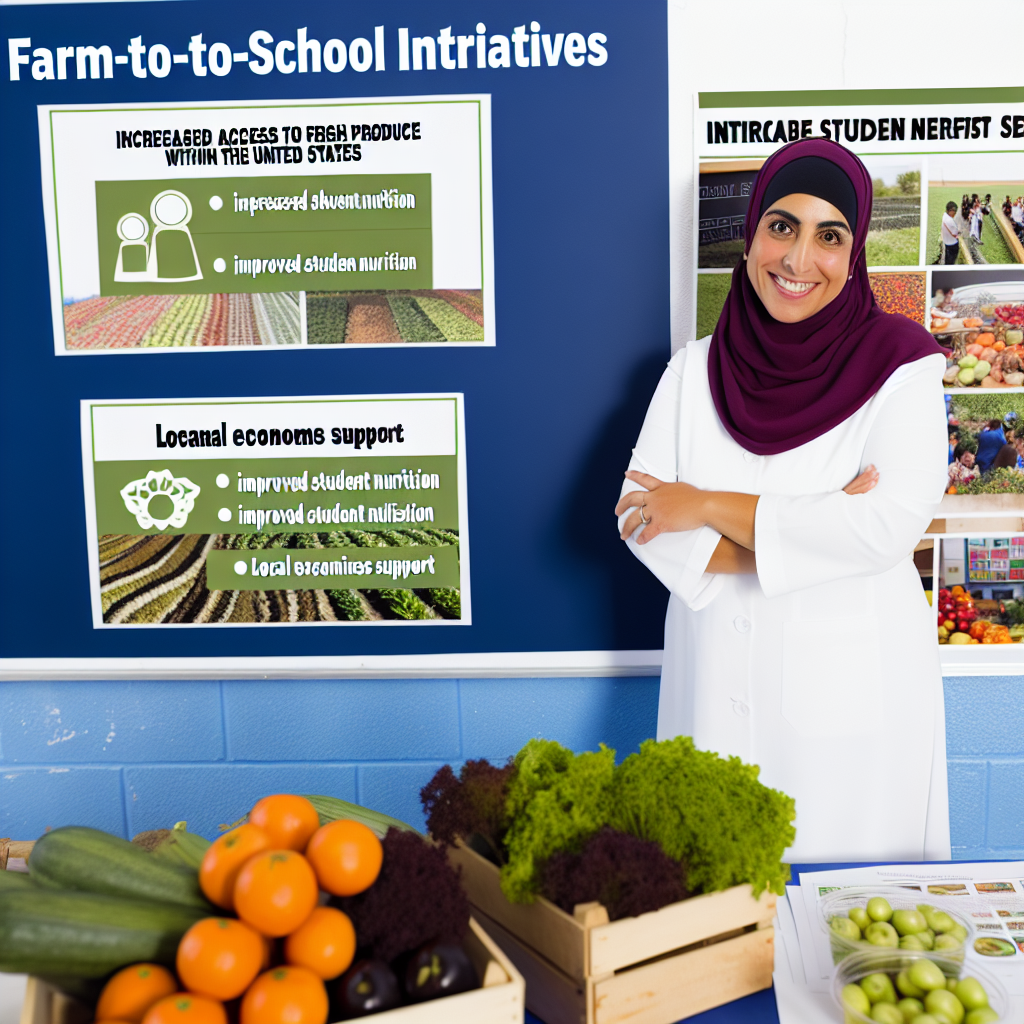Definition and Overview of Farm-to-School Initiatives
Farm-to-school initiatives connect local farms with schools.
They aim to provide fresh, healthy food to students.
Additionally, these programs educate children about nutrition.
They promote the benefits of consuming local produce.
In essence, they create a direct link between agriculture and education.
Core Components
Farm-to-school initiatives consist of several key elements.
Firstly, they enhance school meal programs.
Schools source food directly from local farmers.
This practice supports local economies while ensuring freshness.
Moreover, initiatives often include educational activities.
Students participate in gardening, cooking, and tasting events.
Health and Nutrition Benefits
Providing fresh produce improves student diets.
Healthy eating contributes to better academic performance.
Furthermore, nutrition education fosters lifelong healthy habits.
Children learn to make informed food choices.
Transform Your Agribusiness
Unlock your farm's potential with expert advice tailored to your needs. Get actionable steps that drive real results.
Get StartedThis knowledge reduces the risk of diet-related diseases.
Community Engagement
Farm-to-school programs engage local communities.
Parents and local groups often participate in activities.
This involvement strengthens community bonds.
Additionally, it promotes awareness of sustainable agricultural practices.
Communities benefit socially and economically from these initiatives.
Environmental Impact
Supporting local farms reduces transportation emissions.
Farm-to-school initiatives encourage sustainable farming practices.
These practices enhance local biodiversity and soil health.
Students develop a deeper understanding of environmental stewardship.
Consequently, they become advocates for sustainable living.
Impact on Students’ Nutritional Knowledge and Eating Habits
Enhanced Nutritional Awareness
Farm-to-school initiatives significantly increase students’ nutritional knowledge.
These programs introduce students to fresh, local foods.
As a result, children learn about the benefits of healthy eating.
Moreover, they develop a more profound understanding of food sources.
This awareness often leads to better food choices at school and home.
Behavioral Changes in Eating Habits
Participating in farm-to-school programs encourages healthier eating behaviors.
Students are more likely to try fruits and vegetables.
For instance, research shows increased consumption of whole foods.
Consequently, students reduce their intake of processed foods.
This shift in diet can lead to improved overall health.
Increased Engagement in Food-Related Activities
Farm-to-school initiatives often incorporate hands-on learning experiences.
These activities may include gardening, cooking classes, and farm visits.
As students engage with food preparation, their interest in nutrition grows.
Showcase Your Farming Business
Publish your professional farming services profile on our blog for a one-time fee of $200 and reach a dedicated audience of farmers and agribusiness owners.
Publish Your ProfileThis engagement fosters a sense of ownership over their food choices.
Moreover, they gain practical skills in preparing healthy meals.
Promotion of Long-Term Healthy Habits
Early exposure to nutrition fosters lifelong healthy eating habits.
Children who learn about nutritious foods are better prepared for adulthood.
Ultimately, this knowledge contributes to making informed dietary choices.
Additionally, farm-to-school initiatives can positively influence families.
As students share their learning, families may adopt healthier habits, too.
Enhancement of Local Economy through Support for Local Farmers
Direct Economic Impacts
Farm-to-school initiatives directly benefit local farmers.
These programs create a stable market for their produce.
Consequently, farmers experience increased revenues.
Additionally, these initiatives can spur job creation in rural areas.
Strengthening Community Connections
Farm-to-school initiatives build stronger community ties.
Schools engage local farmers and vendors for consistent supply.
This engagement fosters a sense of community ownership.
Moreover, it encourages students to learn about local agriculture.
Encouraging Sustainable Practices
Supporting local farmers promotes sustainable farming practices.
Farm-to-school programs often emphasize organic methods.
This focus leads to improved land and resource management.
As a result, local ecosystems gain protection and stability.
Boosting Local Food Systems
Farm-to-school initiatives enhance local food systems.
They create a demand for seasonal and local products.
This demand increases the visibility of local farms.
Importantly, it encourages healthier eating habits among students.
Generating Educational Opportunities
These programs offer educational opportunities for students.
For example, children learn where their food comes from.
They also gain insights into nutrition and food preparation.
Ultimately, these lessons can influence lifelong habits.
See Related Content: Local Food Sourcing Trends Every Farmer Should Know
Educational Opportunities in Agricultural Practices and Sustainability
Hands-on Learning Experiences
Farm-to-school initiatives provide students with practical learning experiences.
Students gain firsthand knowledge about farming and food production.
This engagement enhances their understanding of agricultural practices.
Additionally, it promotes a connection between food and the environment.
Curriculum Integration
These initiatives allow schools to integrate agricultural education into the curriculum.
Teachers can design lessons around nutrition and sustainability topics.
For example, students can track the growth of plants in school gardens.
This type of learning reinforces essential science concepts.
Moreover, it helps students develop critical thinking skills.
Community Involvement
Farm-to-school initiatives foster community partnerships.
Local farmers often collaborate with schools to provide resources.
This partnership enhances student learning and community connections.
Showcase Your Farming Business
Publish your professional farming services profile on our blog for a one-time fee of $200 and reach a dedicated audience of farmers and agribusiness owners.
Publish Your ProfileMoreover, it supports the local economy by sourcing food locally.
Promotion of Healthy Eating
Education through farm-to-school programs encourages healthy eating habits.
Students explore diverse fruits and vegetables that local farms provide.
This exposure helps children make informed food choices.
Furthermore, healthy eating is crucial for their overall well-being.
Awareness of Sustainability Practices
Farm-to-school initiatives teach students about sustainable practices.
They learn the importance of reducing waste and preserving resources.
Hands-on activities might include composting and recycling efforts.
Additionally, discussions on renewable energy can spark interest.
This awareness empowers students to make environmentally friendly choices.
Find Out More: Building a Local Food Network on Your Farm
Promotion of Cultural Awareness through Diverse Food Offerings
Embracing Varied Culinary Traditions
Farm-to-school initiatives promote diverse culinary traditions in educational settings.
Students experience foods from various cultures as part of their daily meals.
This exposure fosters appreciation for different world cuisines.
Furthermore, it encourages students to explore their own cultural backgrounds.
Connecting Students to Local Agriculture
Students learn about local farms that provide their meals.
This connection highlights the importance of regional agricultural practices.
Moreover, it enables students to understand where their food comes from.
Such knowledge cultivates respect for food producers and local economies.
Enhancing Social Skills through Shared Meals
Shared meals at school encourage social interactions among students.
Diverse food offerings create opportunities for conversations about cultural dishes.
In turn, these discussions promote understanding and acceptance among peers.
Additionally, students develop teamwork skills while participating in food-related activities.
Curating Educational Experiences
Farm-to-school programs offer workshops that focus on recipe creation.
These workshops often feature global cuisines, enhancing cooking skills.
Students engage in hands-on learning, which reinforces their culinary knowledge.
As a result, they become more curious about trying new foods.
Influencing Positive Dietary Choices
Exposure to diverse foods encourages healthier eating habits.
Students learn the nutritional benefits of various ingredients.
This knowledge empowers them to make informed food choices.
Consequently, they develop a lifelong appreciation for nutritious foods.
Discover More: Challenges in Local Food Sourcing and How to Overcome

Integration of Farm-to-School in STEM Curriculum
Enhancing Scientific Knowledge
Farm-to-school initiatives offer students hands-on experiences with science.
Students can learn about plant biology through school gardens.
They study ecology by observing local ecosystems in action.
Additionally, students gain insights into environmental science by analyzing soil health.
Incorporating Technology in Agriculture
Technology plays a vital role in modern farming practices.
Students can explore innovative agricultural tools and software.
For example, they can use apps to track plant growth.
Moreover, drones can provide data on crop health and yield.
Showcase Your Farming Business
Publish your professional farming services profile on our blog for a one-time fee of $200 and reach a dedicated audience of farmers and agribusiness owners.
Publish Your ProfileEngineering Solutions in Farming
Farm-to-school programs encourage students to design sustainable solutions.
They can build compost bins or irrigation systems as projects.
Such activities connect engineering concepts to real-world challenges.
This practical application enhances problem-solving skills.
Mathematics in Agricultural Practices
Mathematics is essential for analyzing agricultural data.
Students learn to compute yield estimates and resource needs.
They can create graphs to visualize growth trends and harvest times.
Furthermore, budgeting for a school garden teaches financial literacy.
Interdisciplinary Learning Opportunities
Integrating farm-to-school into STEM promotes interdisciplinary learning.
Students can explore nutrition while studying biology.
They can connect math lessons to food measurements and recipes.
This holistic approach makes learning relevant and engaging.
Community Engagement and Collaboration
Farm-to-school initiatives foster partnerships with local farmers.
Students learn about local food systems and sustainable practices.
Community involvement enhances educational experiences.
Additionally, students participate in farm visits and workshops.
See Related Content: How to Start Direct Sales for Your Farm
Development of Life Skills through Cooking and Gardening Programs
Learning through Experience
Cooking and gardening provide hands-on learning opportunities for students.
These programs engage children in practical skills essential for daily life.
Through cooking, students learn about nutrition and meal preparation.
Gardening connects them to the source of their food.
This experience fosters a sense of responsibility and achievement.
Cognitive Development
Cooking requires critical thinking and decision-making skills.
Children plan meals and follow recipes, enhancing their comprehension.
Gardening involves observing plant growth and recognizing seasonal changes.
Such activities stimulate curiosity and encourage inquiry-based learning.
Social Skills and Teamwork
Both cooking and gardening encourage collaboration among students.
Group activities help develop communication skills and teamwork.
Children share ideas and responsibilities while working together.
This fosters a sense of community and belonging in the classroom.
Creativity and Self-Expression
Cooking allows for creativity in ingredient selection and presentation.
Students experiment with flavors and develop personal recipes.
Gardening inspires creativity through landscape design and planting choices.
Each child expresses their individuality through their gardening plot.
Building Healthy Habits
Farm-to-school initiatives promote healthy eating habits from a young age.
Learning to prepare nutritious meals influences food choices later in life.
Gardening teaches students about sustainable practices and seasonal eating.
These experiences encourage lifelong habits of healthy living.
Strengthening Community Ties and Involvement in Schools
Enhancing Local Relationships
Farm-to-school initiatives create strong connections between schools and local farms.
These relationships foster a sense of community among students and farmers.
Showcase Your Farming Business
Publish your professional farming services profile on our blog for a one-time fee of $200 and reach a dedicated audience of farmers and agribusiness owners.
Publish Your ProfileMoreover, they encourage families to engage with local agriculture.
As a result, students gain a deeper understanding of their food sources.
Encouraging Parental Participation
These programs prompt parents to take an active role in school activities.
For example, parents can help by volunteering at school gardens.
Additionally, they can participate in cooking classes that educate their children.
This involvement cultivates a shared commitment to healthier eating.
Building Community Awareness
Farm-to-school initiatives raise awareness about nutrition in the community.
They lead to discussions about local food systems and sustainability.
Furthermore, such initiatives promote the importance of eating seasonal produce.
This awareness often extends beyond the schoolyard into families’ homes.
Promoting Local Economic Growth
Engaging local farms stimulates the economy within the community.
Schools purchasing from local sources contribute to job creation.
Moreover, it encourages diverse agricultural practices in the region.
This not only strengthens local economies but also supports smaller farmers.
Creating Educational Opportunities
Farm-to-school programs provide hands-on learning experiences.
Students often learn about gardening, cooking, and nutrition.
These experiences enhance classroom learning through practical application.
Students become more invested in their education and health.
Additional Resources
Farm to Table: Building Local and Regional Food Systems – SARE
Farm to School (F2S) | Wisconsin Department of Public Instruction




